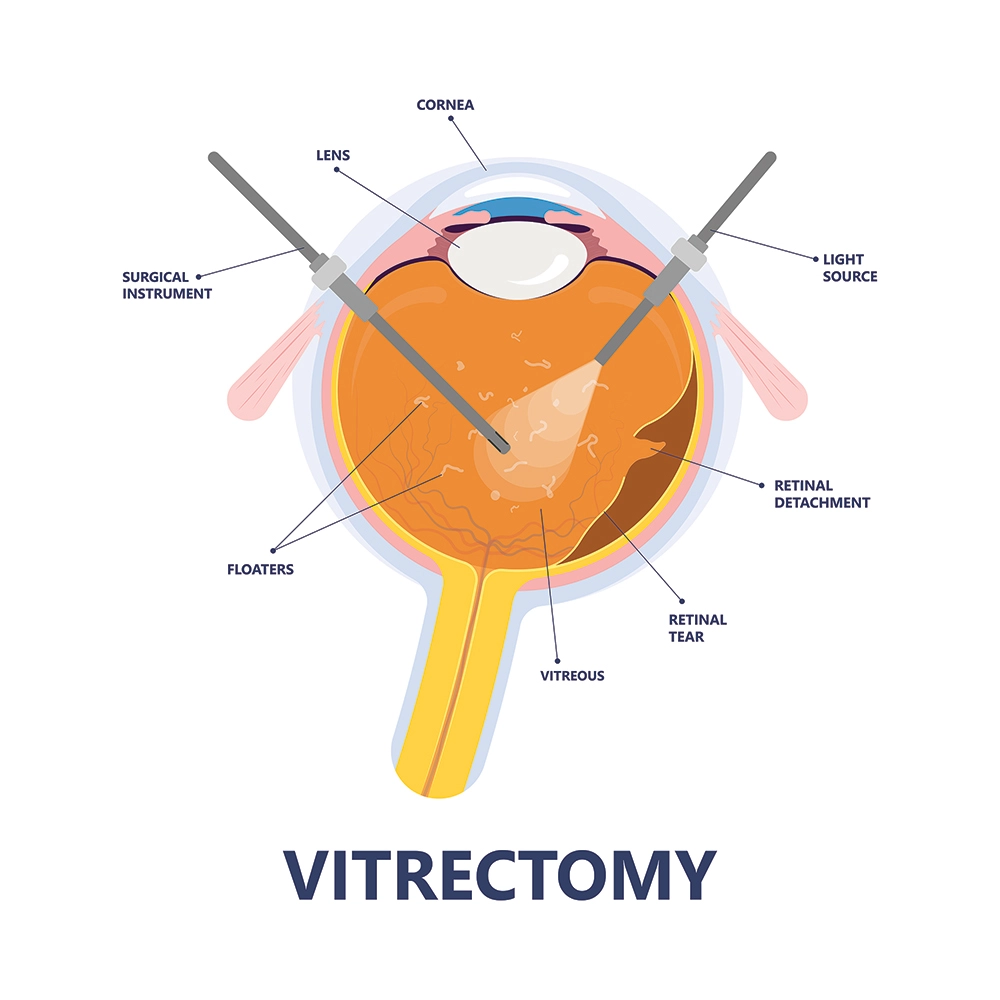
What Is a Vitrectomy?
Vitrectomy is a type of eye surgery that treats disorders of the retina and vitreous. The retina is the light-sensing tissue found lining the inside back part of the eye. The vitreous is the clear, jelly-like substance that fills the inside of the eye. The vitreous is removed during vitrectomy surgery and usually replaced by a saline-type solution.

Why Do I Need a Vitrectomy?
Your doctor may recommend vitrectomy surgery to treat the following eye problems:
- Diabetic retinopathy, where there is bleeding and scar tissue
- Retinal detachments
- Wrinkling of the retina (macular pucker)
- Macular hole (partial loss of vision for fine details)
- Certain problems after cataract surgery
- Infection inside the eye
- Severe eye injury
How Can Vitrectomy Improve My Vision?
Vitrectomy surgery can often improve or stabilize your vision. The operation removes any blood or debris (from infection or inflammation) that may be blocking or blurring light as it focuses on the retina. Vitrectomy surgery removes scar tissue that can displace, wrinkle or tear the retina. Vision is poor if the retina is not in its normal position. A foreign object may be stuck inside the eye as the result of an injury. Most foreign objects will damage vision if they are not removed.

What Should I Expect with Vitrectomy Surgery?
Before Surgery:
Your doctor will decide whether local or general anesthesia is best for you. The majority of vitrectomy surgeries are performed with local anesthesia with monitored anesthesia sedation on an outpatient basis. For elective vitrectomy surgery, any blood thinners will need to be discontinued at least five days prior to surgery.
Vitrectomy Surgery:
The length of the operation varies from under one hour to several hours, depending on the severity of your condition. In certain situations, your doctor may choose to perform another surgical procedure at the same time, such as repairing a detached retina or removing a cataract.
Your doctor performs the operation while looking into your eye with a microscope. Various miniature instruments are placed into the eye through tiny incisions in the sclera (white part of the eye). Most retinal conditions can be treated with a minimally-invasive surgery system performed through incisions which self-seal and require no sutures. All of the doctors at Retina Specialty Institute perform primarily state-of-the-art “sutureless” vitrectomy surgery at several ambulatory surgery centers and hospitals throughout the Gulf Coast.
In order to receive the best possible vision for you, your doctor will do one or more of the following:
- Remove all cloudy vitreous
- Remove any scar tissue present, attempting to return the retina to its normal position
- Treat any foreign object that might be in the eye
- Place an air or gas bubble in the eye to help the retina remain in its proper position. The bubble will slowly disappear on its own.
- Inject a special fluid (like silicone oil) that is later removed from the eye with another surgery.
After Surgery
You can expect some minimal discomfort after surgery. You will need to wear an eye patch for a short time and should avoid any strenuous activity. Your doctor will prescribe eye drops for you and advise you when to resume normal activity.
If a gas bubble was placed in your eye, your doctor may recommend that you keep your head in a special position for a specific amount of time. With a gas bubble or other substance in the eye, your vision will be blurry. You cannot fly in an airplane or travel at high altitudes until the gas bubble is gone. A rapid increase in altitude can cause a dangerous rise in eye pressure.
What Are the Risks of Vitrectomy Surgery?
All types of surgery have certain risks. If the doctor has suggested vitrectomy surgery, then the benefits of surgery far outweigh the risks to your vision.
Some of the risks of vitrectomy include:
- Infection
- Bleeding
- Retinal detachment
- Poor vision
- High pressure in the eye
- Accelerated cataract formation
How Much Will My Vision Improve?
Your vision after surgery will depend on many variables, especially if your eye disease caused permanent damage to your retina before the vitrectomy. Your doctor will discuss your situation with you and how much improvement in your eyesight is possible.
Retina Specialty Institute has been involved in multiple clinical trials, including studies involving vitreoretinal surgery instrumentation, fluids, and machinery. Your retinal surgeon or our staff can answer any questions you may have concerning Vitrectomy Surgery.

Contact Retina Specialty Institute
Inherited retinal diseases require the treatment of a highly experienced specialist. At Retina Specialty Institute, our practice is dedicated to the treatment of all forms of retinal diseases and disorders. Our experts have deep experience in the diagnosis and management of inherited retinal diseases.
The doctors at Retina Specialty Institute have either authored or reviewed and approved this content.
Page Updated:







